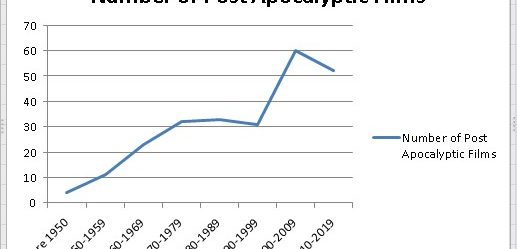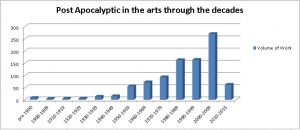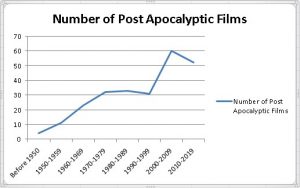Post Apocalyptic by the numbers
Posted by vonnagy on Sep 02 2015, in apocalypticpost, keywords, Post Apocalyptic by the numbers, trends

Its been a very long time and no post – a few years in fact. Its been difficult to keep tabs on ‘post apocalyptic’ happenings in the media just because there has been so much of it. As far as my own voice was concerned, I felt like I didn’t have too much new to offer with so much new post apocalyptic work being done in the arts. This subject still interests me; just call it a bad case of blogger’s block.
So I will put my toe in the water once again and observe what the latest trends and figures are for ‘post apocalyptic’ over the decades by digging into Google Trends, Wikipedia articles, and Google Keyword Planner (an advertising tool).
Below is the graph from Google Trends showing the interest in ‘post apocalyptic’ searches since 2005:
What is interesting is the increase of both literature and films of this genre. For instance, a list of movies over time:
We are half to the next decade and it looks like film and it looks like the output of post apocalyptic films will double before 2020. This from another doubling of output from the 1990’s – before then it was pretty stable. Perhaps the list isn’t perfect – maybe not enough foreign movies or not ‘pure’ post apocalyptic – but regardless, it an interesting trend.
The chart below is rough (very rough) volume count of a Wikipedia article of post-apocalyptic themes through the decades. It is important to note is that for year, I used year the year of origin as some TV, movie, game and books series can cut across decades. Below is a quick excel graph I whipped up after collating the decades from the above article:

This shows that we may have reached ‘peak post apocalyptia’ in early 2000’s; if the current trend continues, there will be less original post apocalyptic literature in the current than in the 1980’s. So while interest in the subject is trending up, as well as in films, new wellsprings of post apocalyptic art is possibly in the decline.
More specifically, below are some keywords taken from post apocalyptic searches per month from Google; it shows a pretty strong interest in the arts, including fiction, film, games, television and fashion. Not outrageously high number counts, but it displays that there is still a healthy interest in the subject matter.
| Keyword | Average Monthly Searches |
| post apocalyptic | 33100 |
| post apocalyptic fiction | 18100 |
| best post apocalyptic movies | 6600 |
| post apocalyptic books | 6600 |
| post apocalyptic games | 5400 |
| post apocalypse | 5400 |
| best post apocalyptic books | 2900 |
| post apocalyptic tv shows | 2400 |
| post apocalyptic clothing | 2400 |
| post apocalyptic romance | 1900 |
| post apocalyptic fashion | 1600 |
| post apocalyptic mayhem | 1600 |
| post apocalyptic anime | 1600 |
| best post apocalyptic games | 1300 |
| post apocalyptic series | 1000 |
| top post apocalyptic movies | 880 |
| post apocalyptic films | 880 |
| post apocalyptic world | 880 |
| post apocalyptic novels | 880 |
| post apocalyptic city | 880 |
| post apocalyptic definition | 880 |
| post apo | 880 |
| postapocalyptic | 880 |
| post apocalypse movies | 720 |
| post apocalyptic art | 720 |
| good post apocalyptic movies | 590 |
| post apocalyptic survival | 590 |
| post apocalyptic tv series | 590 |
| best post apocalyptic novels | 480 |
| post apocalyptic movie | 480 |
| post apocolyptic | 480 |
| post apocalyptic shows | 480 |
| post apocalyptic mmo | 480 |
| post apocalyptic rpg | 480 |
| post apocalyptic clothes | 480 |
So based on these rough indicators gleaned from online research tools, it looks like post apocalyptic interest, especially in the arts, is increasing. The only caveat would be that perhaps original work is on the decline, with a greater emphasis on serialised content.
Is this a bad thing? Some very popular films and games spanned decades such as Mad Max (1970’s, 1980’s, 2010’s) and the Fallout Video Games (1990’s, 2000’s, 2010’s). A few have jumped genres across across the decades, such as the Walking Dead – from comic book to TV series. Whilst there is debate whether sequels ruin the original, I do think the cases above the content has remained fresh. That is a testament that the genre is standing the test of time.
